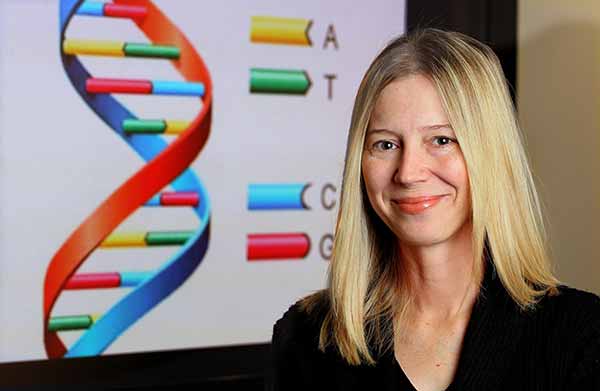
NIH Grant Awards $2 Million for Research into Privacy and Personal Health Information
Published Date
By:
- Micah Siegel
Share This:
Article Content
The National Human Genome Research Institute, a division of the National Institutes of Health (NIH), has awarded $2 million to a team at the University of California, San Diego to research individual conceptions of privacy related to emerging health big data technologies.

Dr. Cinnamon Bloss Photo by Charlie Neuman/UT San Diego/Copyright 2013 San Diego Union-Tribune, LLC. © U-T San Diego/ZUMAPRESS.com/Alamy Live News
The project is led by Dr. Cinnamon Bloss, a faculty member in the School of Medicine Departments of Psychiatry and of Family Medicine and Public Health. Dr. Bloss studies how emerging biomedical technologies affect patients, healthcare providers and consumers amid a rapidly evolving personal privacy landscape. Genome sequencing, wearable sensors and other health information technologies are now sources of unprecedented quantities of personal data, which are often collected in non-clinical settings. For medical professionals, so-called big data present a new opportunity to fill in gaps in more traditional clinical data collection and improve public health; for patients and consumers, they present opportunities for increased control over one’s own health and the possibility of lower healthcare costs.
“We hear a lot about privacy these days, but there is little agreement as to what it actually means,” said Bloss, who is a faculty affiliate of the Center for Wireless and Population Health Systems at the Qualcomm Institute (the UC San Diego division of the California Institute for Telecommunications and Information Technology). “One possible reason is that privacy means different things to different people.” Bloss’s project will develop a new working definition of privacy and a tool to measure individual privacy.
As Bloss notes, definitions of privacy have not kept pace with recent advances in personal health technologies. Privacy was first embodied in law back in the 1800s in response to inventions such as photography and newspapers. Now we have a new set of inventions enabled by advances in digital technologies, and thus, definitions of privacy are once again being challenged.
Bloss and her colleagues at UC San Diego, Stanford University, Carnegie Mellon University, UC Irvine and PatientsLikeMe (an online network for sharing personal health data) will use interviews and focus groups, in addition to leveraging previous research conducted by the Personal Genome Project and Calit2’s Health Data Exploration study, to develop the privacy measurement tool for this project.
“Going into the project, we are proposing that privacy for any one person is a combination of what you bring to the table as part of your personality—levels of trust, experiences to date—and what kind of environment you’re in,” she said. “You might feel differently about privacy based on whether it’s Google asking for information, or your physician.”
She further identifies a variety of potential influences on privacy preferences: belonging to a certain age bracket, having children or encountering a major health challenge might contribute to different conceptions of privacy. Individual privacy definitions may also shift over the course of an individual’s lifetime. A generally healthy person, she said, might be wary of sharing their personal genomic information online, while someone diagnosed with cancer might want to make their genome accessible to experts in order to identify possible treatment targets.
Overall, Bloss’s goals for the new privacy measurement tool are manifold.
“For personal health data companies like Fitbit™, we hope it will help clarify data sharing practices,” she said. At the same time, the privacy measurement tool “will help patients and consumers be better able to manage and share their personal information in a way that is consistent with their preferences.” A third long-term goal is to promote patient- and user-centered design of new health technologies.
“We’re all familiar with signing up for a new app or device and dealing with cumbersome terms of use or privacy policies,” said Bloss. “We want an easy, user-friendly tool where people can assess and communicate their privacy preferences.” Bloss indicated that most research suggests that people are willing to share their information, particularly for health research, but they want the process to be transparent. “What we need to do is enable individual data sharing that both feels safe and is safe,” said Bloss.
Calit2 has a history of supporting research into user privacy and consumer health technologies. Along with two other investigators on her current project, Matthew Bietz (UC Irvine) and Kevin Patrick (UC San Diego), Bloss is a researcher with the Health Data Exploration project, which reported in 2014 that many users of digital health trackers—including wearable devices and mobile health apps—would be willing to share their data with medical researchers if their privacy were assured. Two additional investigators on Bloss’s NIH-funded project, Jeannie Huang and Lucila Ohno-Machado, are faculty affiliates of the Center for Wireless and Population Health Systems.
Share This:
You May Also Like
Stay in the Know
Keep up with all the latest from UC San Diego. Subscribe to the newsletter today.


